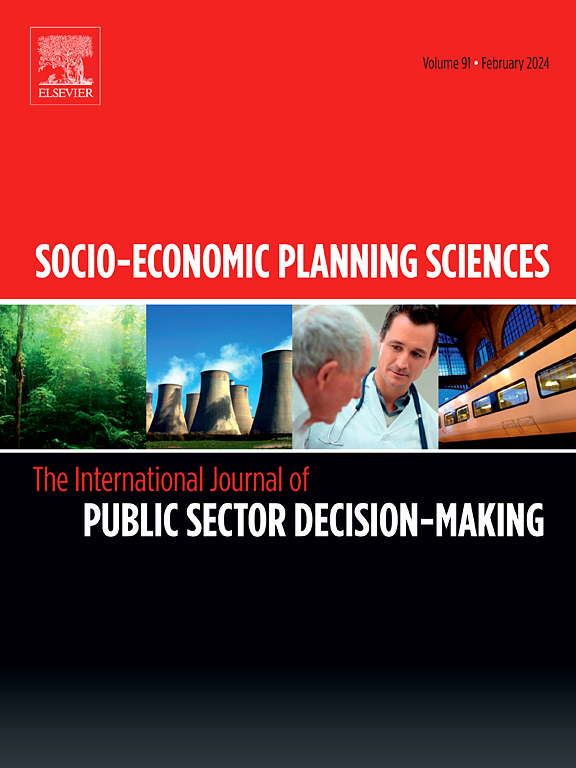后 COVID-19 时代零售供应链复原力的适应性解决方案
IF 6.2
2区 经济学
Q1 ECONOMICS
引用次数: 0
摘要
面对全球化和不可预测的干扰,企业渴望实现其供应链(SC)网络的复原力和可持续恢复。然而,尼日利亚零售企业面临着各种挑战,这些挑战阻碍了其供应链在中断情况下的恢复能力,迄今为止,还没有文献对这些挑战进行分析并提出缓解策略。因此,本研究旨在确定和分析尼日利亚零售企业在中断情况下的业务流程复原力所面临的挑战的重要程度,并提出缓解这些挑战的策略,以增强零售业务流程在后 COVID-19 时代潜在中断风险下的复原力。确定了 19 项挑战,并将其分为三个方面,即运营层面、宏观层面和内部层面。然后,提出了一种将决策试验和评估实验室与香农熵概念和简单加权相结合的方法,以帮助研究分析。结果表明,运营层面的环境对尼日利亚零售企业在中断情况下的自适应能力的阻碍作用最大,排名最高。具体而言,"有限的信贷机制 "是排名最高的挑战,其次是 "缺乏全渠道履行能力"、"交货不正常"、"工人的高福利 "和 "缺乏供应商合作"。此外,"激励机制 "能最大程度地缓解这些挑战,与建立零售业供应链复原力的联系最为紧密,其次是 "数字化 "和 "供应链本地化"。研究结果对后《COVID-19》时代的零售自然科学复原力具有重要意义。本文章由计算机程序翻译,如有差异,请以英文原文为准。
Adaptable solutions for retail supply chain resilience in the post-COVID-19 era
Faced with globalization and unpredictable disruptions, firms aspire to achieve resilience and sustainable recovery of their supply chain (SC) networks. However, Nigerian retail firms are faced with challenges that deter resilience in their SCs under disruptions, and to date, literature is currently non-existent that analyzes these challenges and proposes strategies for their mitigation. This study, therefore aims to identify and analyze the degree of significance of the challenges to SC resilience in Nigerian retail firms under disruptions, as well as propose strategies to mitigate them for enhancing retail SC resilience under potential disruption risks in the post COVID-19 era. Nineteen challenges were identified and categorized into three contexts namely operational-level, macro-level and internal-level. Then, a methodology based on integrating decision-making trial and evaluation laboratory with the Shannon entropy concept and simple additive weighting was proposed to aid in the study analysis. Results indicate that the operational-level context is most significant and ranks highest in deterring SC resilience in Nigerian retail firms under disruptions. Specifically, 'limited credit facility' is the highest ranked challenge, followed by 'lack of Omni channel fulfilment capabilities', 'delivery irregularities', ‘workers’ high welfare package’ and 'lack of supplier collaboration’. Besides, 'incentivisation' mitigates these challenges the most and is strongest linked to build retail SC resilience, followed by 'digitalization' and ‘SC localisation'. Implications are highlighted from the results for retail SC resilience in the post-COVID-19 era.
求助全文
通过发布文献求助,成功后即可免费获取论文全文。
去求助
来源期刊

Socio-economic Planning Sciences
OPERATIONS RESEARCH & MANAGEMENT SCIENCE-
CiteScore
9.40
自引率
13.10%
发文量
294
审稿时长
58 days
期刊介绍:
Studies directed toward the more effective utilization of existing resources, e.g. mathematical programming models of health care delivery systems with relevance to more effective program design; systems analysis of fire outbreaks and its relevance to the location of fire stations; statistical analysis of the efficiency of a developing country economy or industry.
Studies relating to the interaction of various segments of society and technology, e.g. the effects of government health policies on the utilization and design of hospital facilities; the relationship between housing density and the demands on public transportation or other service facilities: patterns and implications of urban development and air or water pollution.
Studies devoted to the anticipations of and response to future needs for social, health and other human services, e.g. the relationship between industrial growth and the development of educational resources in affected areas; investigation of future demands for material and child health resources in a developing country; design of effective recycling in an urban setting.
 求助内容:
求助内容: 应助结果提醒方式:
应助结果提醒方式:


